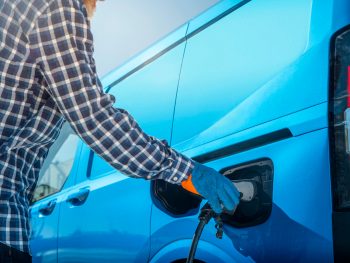More than half of van drivers plan EV switch by 2025
Britain’s white van drivers are going green, with the majority planning to go electric by 2025.

The new research indicates millions of van drivers are planning to go electric within the next two years
Published as concerns mount over a rowback on the 2030 ICE ban, the new research by Gridserve indicates that millions of van drivers are eyeing up an electric vehicle.
Its study of 500 van drivers found more than half (55%) predict they will be behind the wheel of an electric vehicle by mid-decade and more than eight in ten (82%) want to see more companies using environmentally friendly vans in their fleet moving forward.
The research revealed that attitudes to electric vehicles have been changing for the better among van drivers, with 70% saying that they are more likely to switch to a fully electric vehicle compared to five years ago.
It’s due in part to environmental consciousness – with nearly nine in 10 (88%) van drivers believing it’s vital that everyone does their best to be as environmentally friendly as possible.
But economic concerns are also a key factor in the decision to switch to electric; on average, van drivers estimate they could save more than £2,720 in fuel by moving away from petrol and diesel. Six in 10 drivers (63%) also believe that making the switch could open new opportunities to do more business with a socially conscious clientele.
Sam Clarke, chief vehicle officer at Gridserve, said: “It’s great that today’s van drivers are ready to make the switch to electric.
“Van drivers are a key part of the electric road revolution and will make a huge impact as more and more switch to cleaner vehicles. Our calculations estimate that switching the UK’s fleet of vans to electric could save 15 million tonnes of CO2 every year. In London alone, 664,000 tonnes of CO2 could be saved every single year by switching all the petrol and diesel vans in the capital to electric. Beyond air quality, businesses could save a collective £2.4m a day from Congestion Charge, too, and even more once you consider the new ULEZ expansion.”
As well as showing the changing profile of the van fleet, the research shows many van drivers are embracing the changing profile of the ‘white van man’.
Over half (59%) say they’d prefer that this stereotype be retired in favour of a more inclusive term and one in three (32%) happy to be referred to as a ‘white van person’. Meanwhile, 55% van drivers have noticed an increase in van drivers who aren’t men and 42% have noticed more younger drivers in vans than ever before.
Electric van transitionGridserve













Martin Winlow21. Sep, 2023
One small problem with that… There *are* no vans (at least not in the same way that there are e-cars, now). With Big Auto *still* fighting the transition to EVs tooth and nail (and therefore providing next to *nothing* in the way of cars, let alone vans) in the absence of any evidence suggesting Tesla is stepping up to the plate, it will be (previously unheard of) Chinese brands that will dominate white van-land in 5 years time.
It will be interesting to see how UK Plc comes out of the ridiculous spectacle of the EU imposing tough tariffs on Chinese EVs entering Europe that Brussels is whining on about at the moment. They tried it with PV and that back-fired terribly – from the perspective of everyone meeting the CO2 reduction obligations, at least. Potentially, the UK could act as a springboard for Chinese exports to the EU – possibly by them being built here, maybe?
Anyway, whatever happens, interesting times to be sure!